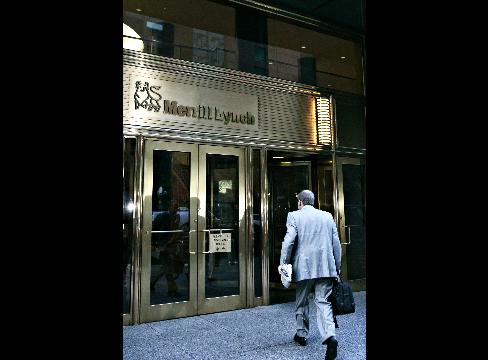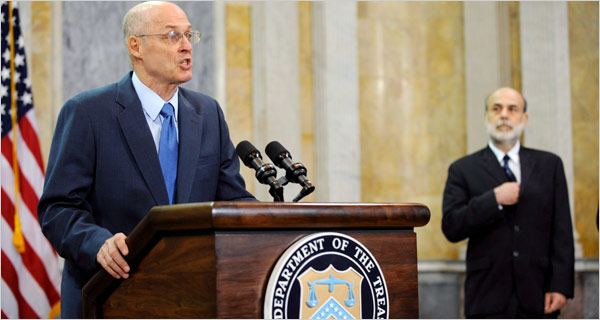Oh My God.
I write two Tickers on The FDIC and banks’ refusal to take their marks, and gee, you’d think someone over there might have read them!
SAN FRANCISCO (MarketWatch) — The Federal Deposit Insurance Corp. said late Monday that banks should recognize losses on home loans promptly and warned that failure to do so could delay efforts to mitigate the financial impact.
Institutions must analyze the collectibility of the loans they hold for investment at least every quarter, the FDIC said in a statement on its Web site.
Banks then have to keep an appropriate allowance for loan and lease losses, covering estimated credit losses on individually evaluated loans that are deemed to be impaired, and on groups of loans with similar risk characteristics, the regulator said.

That’s just too much.
Let me put it in simple English, Ms. Bair. Here ‘ya go, in formal letter format:
From: The Tickerguy
To: Ms. Sheila Bair, FDIC Chairwoman
Regarding: Your FDIC Statement Nonsense
Dear Ms. Bair;
You know full well that essentially every bank in the nation, including the largest ones that went through the so-called “Stress Tests”, have been intentionally mis-marking loans “held for investment” at or near par even when there is essentially no chance these loans will be satisfied in full, and that this practice has been going on since the housing crisis began.
These include defaulted loans; there are literally millions of Americans that are living rent-free, right now, because their lender has sent out a NOD and then done nothing else, despite never paying another penny toward their mortgage.
Why is the bank doing this?
That’s not hard to figure out.
If the banks foreclose and sell the property then the sale price becomes the indisputable mark to market on that paper, and avoiding that mark is absolutely critical or these banks would be forced to recognize their own insolvency.
Thus we have people who live in their houses for more than a year with nothing more than a NOD in the mailbox, we have people who have had their homes foreclosed upon and then the bank has refused to perfect title (leading to stories in the media of foreclosed owners being chased for neglected upkeep, code violations and similar) and we have banks that have made a practice of bidding themselves in the foreclosure auction for the full mortgage amount, which of course is dramatically more than anyone else will pay for it. They wind up “owning” their own foreclosure but the paper remains marked at the full mortgage amount, since that’s what they bid, even though there’s not a snowball’s chance in Hell that any real buyer would pay anything close to that amount (evidenced by the lack of bids at or above that amount at the auction!)
I have repeatedly stated (and shown my work) that there was likely $3 trillion in total “bad paper” in the banking system in residential mortgages alone.
We know for a fact that recovery is running in the neighborhood of 40% (including both first and second lines) from those loans that have been followed through from default to recovery. We know for a fact that bid lists of defaulted second lines circulate all the time and trade literally at a few pennies on the dollar; thus, a second line behind a defaulted first loan is essentially worth zero.
We also know that about $1 trillion in bad loans have been written down thus far, which means there is two trillion more to go, and then we get to talk about commercial real estate where “extend and pretend” has even become part of the vernacular of the trade!
Ms. Bair, this sort of misdirection is the worst sort of tripe. You have two banks with self-identified negative Tier Capital Ratios, a circumstance that is never supposed to happen, but it has.
You have a third identified bank that had its last real chance for a rescue evaporate Friday and it reported, at the same time, a quarterly loss of more than five times its market capitalization.
All three of these institutions should have been seized LAST FRIDAY, but there’s a problem with doing that, isn’t there Ms. Bair? It’s this table here showing how much money you have left in your insurance fund, and the average loss for a seized institution:
The last line in particular shows a paltry $8.26 billion dollars left. Now since the FDIC thinks its cute to be somewhat secret about exactly how much money it has (and what of that is committed) we don’t have hard numbers, but this was a “best guess” sent to me the other night – and it looks about right.
So exactly how do you intend to close those three (and the other few hundred similarly-situated) banks and make sure Granny gets her $20,000 life savings back? With your good looks? Yes, I know, you have a potential $500 billion credit line from Treasury, but that line isn’t funded and in order to do so Turbo Tax Timmy would have to go auction off another $500 billion in Treasuries, and there might be a tiny problem with doing that, given the insane rate of issuance already taking place.
Read moreFDIC “Tells Banks” To Quit Cooking The Books! ROFL!








